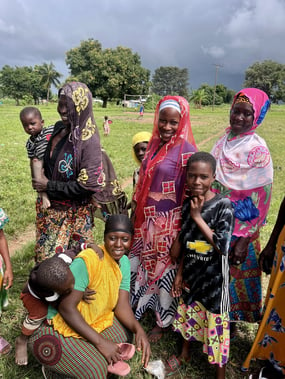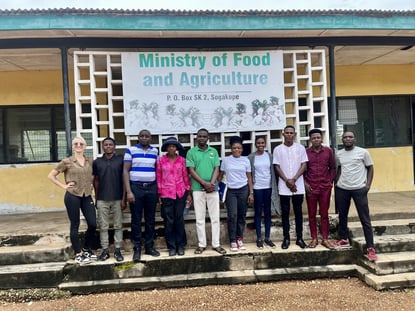Grantee | AlphaMundi Foundation (AMF) (Awarded in January 2025)
Project | Green Growth Alliance: US/Japan Climate-Gender Innovation Collective for Africa

What happens when a climate- and gender-focused foundation in Nairobi taps into the financial know-how of New York and the technical expertise of Tokyo to support entrepreneurs in Kenya? A new kind of international development emerges—one based not on top-down aid but on peer-to-peer mentorship.
The AlphaMundi Foundation’s new initiative, Green Growth Alliance: US/Japan Climate-Gender Innovation Collective for Africa, brings together small and medium-sized enterprises (SMEs) in Africa with mentors from the United States and Japan. These entrepreneurs are tackling two of the most urgent challenges of our time—climate change and gender inequality—and the program gives them tools, guidance, and networks to scale their impact.
This innovative initiative is being led by Sawa Nakagawa, a 2019 and 2022 Fellow of the U.S.-Japan Leadership Program (USJLP). The project took shape after Nakagawa received a delegate stipend from the United States-Japan Foundation, which allowed her team to conduct an initial feasibility study across Kenya, the U.S., and Japan. That small but strategic grant enabled them to identify needs, test assumptions, and refine the program design—exactly the kind of catalytic support that makes larger innovation possible. (Photo credit: Agricentric)
A Triangular Model of Global Partnership
 At the heart of this program is an unusual triangle: African entrepreneurship, Japanese expertise, and American financial innovation. While the U.S. and Japan have a long history of bilateral cooperation, especially in Africa through mechanisms like TICAD and USAID, this initiative makes Africa an equal and essential third partner. In light of the drawing back of USAID around the world, partnerships such as AMF are all the more important. (See the AlphaMundi Group Nairobi team in the photo.)
At the heart of this program is an unusual triangle: African entrepreneurship, Japanese expertise, and American financial innovation. While the U.S. and Japan have a long history of bilateral cooperation, especially in Africa through mechanisms like TICAD and USAID, this initiative makes Africa an equal and essential third partner. In light of the drawing back of USAID around the world, partnerships such as AMF are all the more important. (See the AlphaMundi Group Nairobi team in the photo.)
The structure is elegant: African SMEs apply to be mentored; U.S. and Japanese professionals apply to mentor. Selected mentors—three to five per business—work with the SMEs over six months on everything from market strategy to carbon credits to data analytics. For some mentors, there’s an opportunity to visit Kenya for an immersive, on-the-ground collaboration.
Climate, Gender, and the Potential of Africa’s Entrepreneurs
Africa produces less than 10% of global greenhouse gas emissions but faces the brunt of climate impacts. At the same time, female entrepreneurs receive just 7% of venture capital funding across the continent. AMF’s program tackles both disparities head-on by prioritizing climate-focused, gender-forward enterprises. “We consider climate change and gender inequality to be the two greatest challenges that we have in the world,” says Nakagawa. And the solutions aren’t imported—they’re homegrown. One Kenyan business that AMF has previously supported is pioneering the use of black soldier flies to create animal feed. These insects consume organic waste and transform it into nutrient-rich protein, significantly reducing the environmental footprint of animal feed production. Another, Kazi Yetu in Tanzania, is a women-owned specialty tea and botanical company that uses ethical sourcing, uplifting communities and creating jobs through local value addition. (Photo credit: Kazi Yetu)
And the solutions aren’t imported—they’re homegrown. One Kenyan business that AMF has previously supported is pioneering the use of black soldier flies to create animal feed. These insects consume organic waste and transform it into nutrient-rich protein, significantly reducing the environmental footprint of animal feed production. Another, Kazi Yetu in Tanzania, is a women-owned specialty tea and botanical company that uses ethical sourcing, uplifting communities and creating jobs through local value addition. (Photo credit: Kazi Yetu)
“Because the company is able to produce high-quality, organic tea using regenerative practices, they enable women smallholder farmers to participate in the tea value addition, increasing their income and impacting their livelihoods,” Nakagawa explained. “It’s a great business model—and also one that treats workers with dignity.”
These are science-based, scalable models of sustainability. What they often lack, for such high-impact SMEs, is capacity-building support and capital.
A Financial Brain Meets a Social Mission

Nakagawa knows both sides of that equation. With an MBA and MIA from Columbia University, she started her career with UBS in Tokyo and London, where a privatization transaction in South Africa opened her eyes to how private capital could empower historically marginalized communities. She moved to the International Finance Corporation, part of the World Bank, then to run an impact investment company that invests in businesses started by historically disadvantaged South Africans, and eventually founded her own advisory firm in Johannesburg and Nairobi.
Now, as Executive Director of AMF, she’s helping to build the kind of ecosystem that fosters sustainability and inclusive growth—one that blends technical assistance, smart capital, and measurable impact. “We do good—but using more sustainable, financially resilient programming,” she says. “That’s where the world is going.” (Photo credit: AgriCentric)
AMF has a proven ability to multiply every grant dollar into tangible returns: historically, each $1 in SME support has attracted $14 in private investment or grants. That’s more than charity—it’s catalysis. And this is all done with only four regular staff members.
Program to Platform
 With 15 SMEs and 60–80 mentors expected to participate in the first year, the program is ambitious. Mentors aren’t required to have African experience—just curiosity, relevant skills, and a willingness to listen and learn. However, its impact may extend far beyond those numbers. AMF will publish toolkits, case studies, and blog posts to share its model with other funders, while the cross-continental mentor network may spark entirely new forms of collaboration.
With 15 SMEs and 60–80 mentors expected to participate in the first year, the program is ambitious. Mentors aren’t required to have African experience—just curiosity, relevant skills, and a willingness to listen and learn. However, its impact may extend far beyond those numbers. AMF will publish toolkits, case studies, and blog posts to share its model with other funders, while the cross-continental mentor network may spark entirely new forms of collaboration.
From the USJF perspective, this project is not just aligned with its mission—it embodies it. The blend of ethical investing, catalytic capital, and local empowerment is at the heart of what USJF aims to support: forward-thinking programs that bring new approaches to new places—and sectors—that haven’t traditionally had access to them. (Photo credit: InsectiPro)
In that sense, AMF’s mentorship collective is both a valuable project in itself and also a blueprint for how global cooperation can actually work—and one important direction that USJF philanthropy is going.
Gratitude and Vision
“The launch of the US-Japan Climate-Gender Innovation Collective for Africa is timely, given the increasing impact of climate change across Africa, while many entrepreneurs – particularly women – play a critical role in developing and scaling innovative solutions,” said Sawa Nakagawa.
“We are deeply grateful to the United States–Japan Foundation for its generous support and for believing in our vision to build a lasting network across the U.S. and Japan to galvanize support towards Africa’s inclusive and sustainable future.”
If you are interested in learning more or partnering with AlphaMundi Foundation, please contact amfinfo[at]alphamundi.ch

